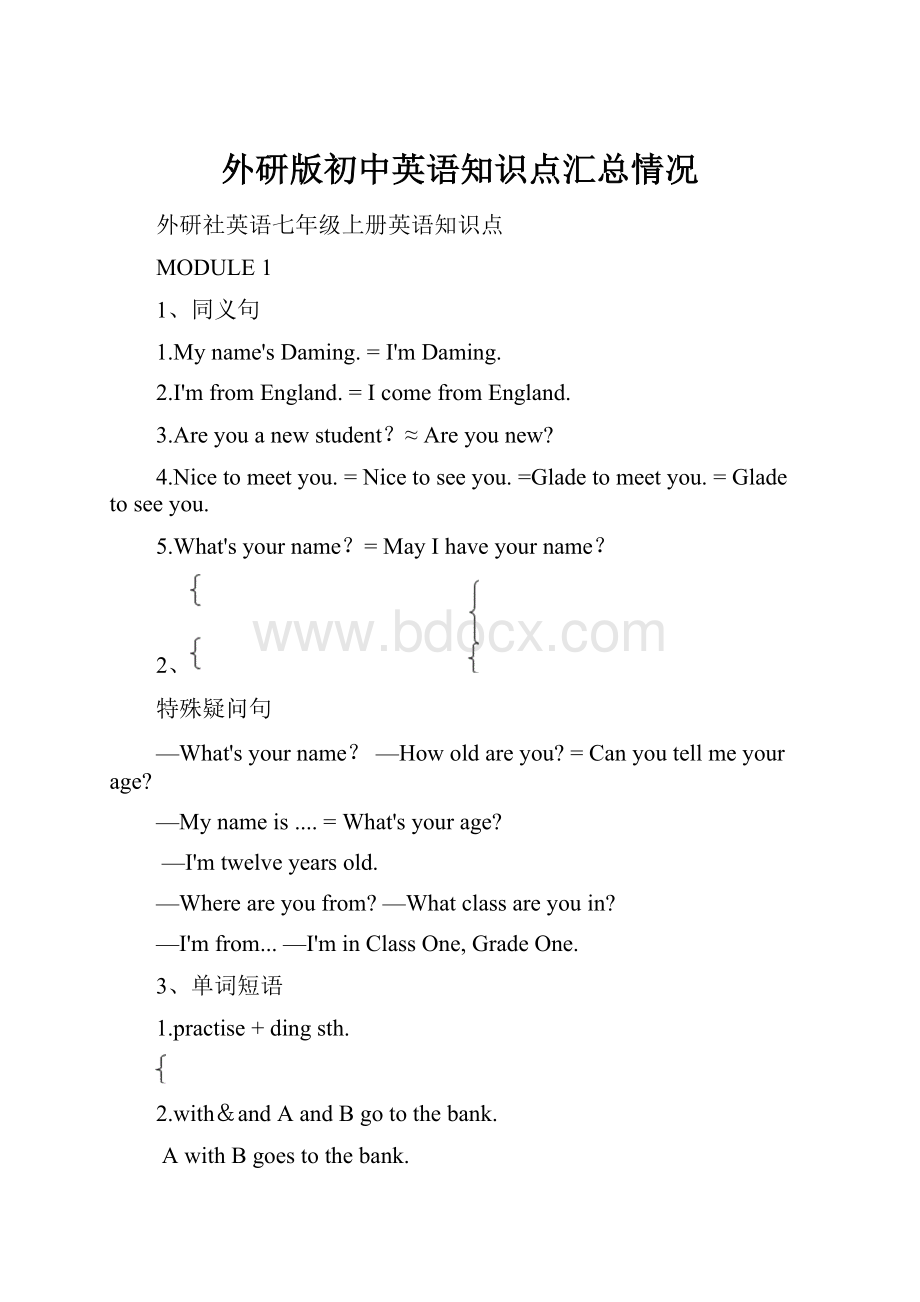外研版初中英语知识点汇总情况.docx
《外研版初中英语知识点汇总情况.docx》由会员分享,可在线阅读,更多相关《外研版初中英语知识点汇总情况.docx(130页珍藏版)》请在冰豆网上搜索。

外研版初中英语知识点汇总情况
外研社英语七年级上册英语知识点
MODULE1
1、同义句
1.Myname'sDaming.=I'mDaming.
2.I'mfromEngland.=IcomefromEngland.
3.Areyouanewstudent?
≈Areyounew?
4.Nicetomeetyou.=Nicetoseeyou.=Gladetomeetyou.=Gladetoseeyou.
5.What'syourname?
=MayIhaveyourname?
2、
特殊疑问句
—What'syourname?
—Howoldareyou?
=Canyoutellmeyourage?
—Mynameis....=What'syourage?
—I'mtwelveyearsold.
—Whereareyoufrom?
—Whatclassareyouin?
—I'mfrom...—I'minClassOne,GradeOne.
3、单词短语
1.practise+dingsth.
2.with&andAandBgotothebank.
AwithBgoestothebank.
4、形容性物主代词
I--myyou--yourhe--hisshe--herit--its
we--ouryou--yourthey—them
重难点:
1.Myname'sDaming.=I'mDaming.
2.I'mfromEngland.=IcomefromEngland.
3.Areyouanewstudent?
≈Areyounew?
4.Nicetomeetyou.=Nicetoseeyou.=Gladetomeetyou.=Gladetoseeyou.
5.What'syourname?
=MayIhaveyourname?
6.with&andAandBgotothebank.
AwithBgoestothebank.
7.I--myyou--yourhe--hisshe--herit--its
we--ouryou--yourthey—them
MODULE2
1、单词
职业:
doctormanagersecretaryworkerteacher
工作地点:
factoryhospitalhotelofficeschooluniversity
2、短语
aphoto\pictureofmyfamily
三、语法(can)
Candosth.Ican\can'trideabike.
Canyourideabike?
Yes,Ican.\No,Ican't.
四、句子
Whatdoesyour...do?
=Whatis\areyou...'sjob?
=Whatisyour...?
He\Sheisa...They're...
重难点:
1.play与不同的名词搭配时所表达的意思是不同的,play与球类搭配时是不需要加定冠词the,如:
playfootball,basketball,volleyballandsoon.Play与乐器搭配时是需要加定冠词the,如:
playthepiano,theguitarandsoon.
2.固定搭配:
rideabike/horse,speakEnglish/Japanese/Chinese,singasong,swim.
3.不定冠词a与an的用法
4.语法知识:
Can的用法CandosthCan+主语+dosth?
Yes,主语+can./No,主语+can’t.
Ican’tdosth.
5.Whatdoesyour...do?
=Whatis\areyou...'sjob?
=Whatisyour...?
He\Sheisa...They're...
MODULE3
1、单词
1.buildingsinschool:
classroomdininghallgymlibraryofficesciencelab
2.something:
blackboardbookclassroomcomputerdeskdictionaryfootballlibrarypicturetelevision
3.numbers:
thirteenfourteenfifteensixteenseventeeneighteennineteenthirtyfortyfiftysixtyseventyeightyninety
4.介词:
nextto≈nearbehind≠infrontofinonunder
5.
infrontof:
在......前面
inthefrontof:
在......里面的前面
6.right正确的≠wrong
右边的≠left
2、语音er、or、ur发/ə/
3、语法(Therebe)
----Arethereanyschooloffices?
----Yes,thereare.Therearesomeoffices.
----IsthereacomputeronMissLi'sdesk?
----No,thereisn't.
注意:
1.就近原则:
Thereissomemeatandtwoappleonthedesk.
2.名词所有格:
MissLi'sher
LilyandLucy's两人共有的eg:
LilyandLucy'sfather.
Lily'sandLucy's两人各有的Lily'sandLucy'sfathers.
重难点:
1.重要单词:
classroomdininghallgymlibraryofficesciencelabblackboardbookclassroomcomputerdeskdictionaryfootballlibrary
2.介词的用法:
nextto≈nearbehind≠infrontofinonunder
3.infrontof与inthefrontof的区别
4.语法知识:
----Arethereanyschooloffices?
----Yes,thereare.Therearesomeoffices.
----IsthereacomputeronMissLi'sdesk?
----No,thereisn't.
就近原则:
Thereissomemeatandtwoappleonthedesk.
5.名词所有格:
MODULE4
1、familymembers:
auntunclegrandmagrandmothergrandpagrandfathermotherfathermumdadsisterbrother
2、
短语句型
Thankyouforyouremail.
yourhelp.
helpingme.
askingme.
invitingme.
Makeafamilytreeforyourfamily.
----Howmanypeoplearethereinyourfamily?
----Therearefour.Therearemymumanddad,mysisterandme.
----Haveyougotanaunt?
/any.....?
----Yes,Ihave./No,Ihaven't.
----Haveyougotasmallfamilyorabigfamily?
----I'vegotabigfamily.(选择疑问句)
or的用法:
①或;②并列否定:
Idon'tlikeswimmingordancing.
重难点:
1.重要单词:
auntunclegrandmagrandmothergrandpagrandfathermotherfathermumdadsisterbrother
2.重要短语:
Thankyoufordoingsth./Thanksfordoingsth.
3.havegot的用法
4.重难点:
or的用法:
①或;②并列否定:
Idon'tlikeswimmingordancing.
MODULE5-6
1、单词
1.orange橙汁havesomeorange[U]
橙色theorangesareorange[C]
橙子Thisisanorange[C]
2.
Kind善良Heisverykind.
种类=typeakind/typeoffruittwokinds/typesoffruits
3.
gym:
不受天气影响的室体育馆、健身房或运动馆
stadium:
周围有看台的露天大型运动场
4.
healthy≠unhealthykeep/stayhealthy
ingoodhealth≠inpoor/badhealth
behealthy=beinhealth
goodforonehealth≠badforonehealth
条件
变化形式
例词
一般情况
+-s
shops
单词以s、x、ch、sh结尾
+-es
buses
以辅音字母+y结尾
去y为i+-es
city-cities
单词以“o”结尾
有生命
+-es
tomatoes
无生命
+-s
zoos
一些以‘f’或‘fe’结尾的单词
把’f‘或’fe‘变成’ves'
knife-knives
2、短语
三、句型
四、区别
重难点:
1.重要单词:
orange三个不同的含义,health(n.)与healthy(adj.)的区分.
2.重要短语与句型:
详见知识点概括
MODULE7
1、
短语
aboutsth.谈论某事
talktosb.跟某人谈话(一方讲一方听)
withsb.跟某人谈话(双方都讲)
getup≠gotobed
gohome≠leavehome(for)
studyscience/history/chemistry/maths/...
2、语法①时间表达法:
____What'sthetime?
Whattimeitis?
直读法:
It'stwoten.(2:
10)
____逆读法:
①It'stenpasttwo.(2:
10)≤30'
②It'stentoten.(2:
50)>30'
整点表达法:
It'stwoo'clock.(2:
00)(不用介词)
注意:
1.2.
3.
②一般现在时
(1)
【No.1】一般现在时的功能
1.表示事物或人物的特征、状态。
eg:
Theskyisblue.
2.表示经常性或习惯性的动作。
eg:
Igetupatsixeveryday.
3.表示客观现实。
eg:
Theearthgoesaroundthesun.
【No.2】一般现在时的构成
1.be动词:
主语+be(am,is,are)+其它。
eg:
Iamaboy.
2.行为动词:
主语+行为动词(+其它)。
eg:
WestudyEnglish.
【No.3】否定句
1.be动词的变化:
主语+be+not+其它。
eg:
Heisnotaworker.
2.行为动词的变化:
主语+don't(doesn't)+V原形(+其它)。
eg:
Idon'tlikebread.
重难点:
1.重要短语:
talkaboutsth/talkwithsb/talktosb.
2.时间的表达(直读法与逆读法)
3.一般现在时的概念与用法1(详见知识点总结)
MODULE8
1、短语句型
bedifferentfromasksb.(not)todosth.haveahabitofdingsth.
getsth.fromsb.byherfavouritesingersaboxofcandies/chocolates
ontelevisionwearsilkshirtsapairofjeans/trainers/glasses/shoes
send/givesth.tosb.make/buy/choosesth.forsb.
=send/givesb.sth.=make/buy/choosesb.sth.
2、语法
①一般现在时
(2)
【No.1】一般现在时中第三人称行为动词的变化规律
规则
动词原形
第三人称单数形式
一般动词后词加s
play
plays
以s、x、ch、sh结尾加es
guess
guesses
以辅音字母加o结尾加es
go
goes
以辅音字母加y结尾去y为ies
study
studies
②形容词性物主代词
人称
单数
复数
主格
形容性物主代词
主格
形容性物主代词
第一人称
I
my
we
our
第二人称
you
your
you
your
第三人称
he
his
they
their
she
her
it
its
usually、always、often、never+n.
be+usually、always、often、never
③频度副词用法
重难点:
1.重要短语
2.一般现在时的概念与用法2(详见知识点总结)
3.形容词性物主代词的用法
MODULE9
1、单词
①Namesoftheanimals
camelelephantgiraffekangaroomonkey--monkeys
Snakepandalionzebrapolarbearwolf--wolves
②及动物居住地
AsiaAfricaEuropeOceaniaAmericaNorth/SouthAmerica
AsianAfricanEuropeanOceaniaAmerica
inthedesert/forest/grassland/jungle/sea/wildtheArctic
2、
短语
3、语法
①一般现在时(3)
【No.1】一般疑问句
1.be动词的变化:
Be+主语+其它。
eg:
-Areyouastudent?
-Yes.Iam./No,I'mnot.
3.行为动词的变化:
Do(Does)+主语+动词原形+其它。
eg:
-Doyouoftenplayfootball?
-Yes,Ido./No,Idon't.
重难点:
1.重要单词:
camelelephantgiraffekangaroomonkey--monkeys
Snakepandalionzebrapolarbearwolf--wolves
2.重要短语:
5thousand与thousandsof+名词的区别
3.行为动词的一般疑问句的形式变化:
:
Do(Does)+主语+动词原形+其它。
eg:
-Doyouoftenplayfootball?
-Yes,Ido./No,Idon't.
MODULE10
1、单词短语
connectsth.tosth.writeanameforitonthecomputer/phone/television
savethedocumentsaveone'slifewriteone'shomework
goonline/offlinesendemailandphotosmaketravelplanscheckthetraintimetablegetinformation(apieceofinformation)
downloadmusicvisitonewebsiteon/fromtheInternet
at/onweekends/weekdays/theweekend/weekday
switchon/offturnon/offakind/twokindsofmusic
different/allkindsofmusicmonitor(班长、显示器)mouse→mice老鼠
saysth.talkaboutsth./withsb./tosb.speak+language→mouses鼠标
tellsb.sth./sb.todosth./astorysometimes/sometimes/sometime
2、语法
①一般现在时(4)
【No.1】特殊疑问句
1.be动词的变化:
疑问词+一般疑问句。
eg:
Whereismybike?
2.行为动词的变化:
疑问词+一般疑问句。
eg:
Howdoesyourfathergotowork?
重难点:
1.重要单词与短语:
2.语法(详见知识点汇总)
外研社英语七年级下册英语知识点
MODULE1
1.listen听(强调动作)hear听见(强调结果)
IlistenedcarefullybutIheardnothing.我仔细听但什么也没听到。
2.Weareonaschooltrip.我们在参加学校郊游。
3.Whataretheothersdoing?
其他人在干什么?
4.lieinthesun/onthebeach躺在沙滩上
5.sendsbapostcard寄给某人一明信片sendsth.tosb.=sendsb.sth.
6.enjoytheschooltripalot/verymuch非常喜欢学校郊游
7.anyway无论如何(转移话题)
8.buysomepresents=shopforpresents买礼物buysth.forsb.=buysb.sth.
goshoppingforpresents去买礼物
9.enjoysth.喜欢某物enjoyoneself=haveagood/greattime
enjoy/likedoingsth.喜欢做某事
10.takesth.tosw.把某物带到某地takeaway
11.atthismoment=now此时此刻(现在进行时)
12.indifferentplaces在不同的地方(比较thesame)13.dodifferentthings做不同的事情
14.leavework下班beatwork上班Heisatwork.=Heisworking.
15.waitforbuses等公共汽车16.runfortrains跑去乘火车
17.haveafternoontea喝下午茶18.gototheopera去听歌剧
19.watchaballet看芭蕾20.getdressed穿衣;打扮seefriends看望朋友
20.callhome给家里打callsb.=givesb.acall=phonesb.
21.greetingsfrom…来自……的问候22.talkonone’sphone用某人的手机打
23.dotaijiquan,打太极拳doyangge扭秧歌
24.现在进行时的构成:
be动词+动词的现在分词
MODULE2
1.WhattraditionsdoyouhaveattheSpringFestival?
在春节你们有什么传统?
2.lotsoftraditions许多传统3.cleanthehouse打扫房子dosomecleaning
4.sweepawaybadluck扫走坏运5.paint……red把……涂成红色
6.Itmeans它意味着……Whatdoesitmean?
(meaningn.)
7.decorate…with…用……装饰……8.haveahaircut剪头发
9.everyone后面谓语动词用单数:
everyonehasahaircut
10.visitourfamilyandfriends看望亲戚朋友
11.atmidnight在半夜(atnoon=inthemiddleofday)12.fireworks用复数
13.bringsb.sth.=bringsthtosb.给某人带来……bringback
14.atnight,intheevening
15.getreadyforsth.(bereadyforsth.)getreadyfordoingsth.为……做准备
16.sweepthefloor扫地17.learnadragondance学舞龙
18.makelanterns做灯笼19.cookthemeal做饭dosomecooking
20.beinterestedinsth对某物感兴趣beinte